 Meg Whitman, CEO of eBay appears to be justifying eBay’s decision to purchase Skype.
Meg Whitman, CEO of eBay appears to be justifying eBay’s decision to purchase Skype.
There’s been much talk that eBay overpaid for Skype, at $4.1Bn if they hit earnings targets.
My view is that they actually got a bargain.
Meg Whitman is right that “in the end, the price that anyone can provide for voice transmission on the ‘Net will trend toward zero,” and she sees that happening “in the next three to six years.” I’m assuming that she means all phone calls, as Net-based calls are currently free and it would be very worrying if she didn’t know that already.
With Skype, they’ve bought the biggest name in VoIP. Not just software-based VoIP (which Skype currently is), but all VoIP.
Whitman’s view? “Our belief is that the winner in this space will be those that have the largest ecosystem. What I mean by that is: the largest number of registered users, the largest number of voice minutes, the largest number of developers who develop the platform, the best product … that users are willing and want to pay for.”
I’ve always admired the genius of Skype, building a telecoms company, the equivalent of BT’s or AT&T’s retail business, but with a near-zero infrastructure cost to them – certainly zero compared with either of the previously named giants. Skype simply piggy-backed on their expenditure.
When I put this to Niklas Zennstrom, Skype’s CEO, as I interviewed him in the build-up VON in Stockholm, he smiled wryly. He’s good at that.
While Vonage went the route of building IBM, needing hardware where it was installed, Skype went the Microsoft route, software. We all know who won there.
Skype knew that the hardware would follow as their user numbers became irresistible. Cleverly they would take license fees from the hardware producer, while making their service more attractive.
 ___What does eBay add?
___What does eBay add?
Well there’s the obvious reasons …
They’ve got huge amounts of cash, as eBay is so profitable, clearly useful, but in the grand scheme of things, so what?
More interestingly they’ve got 168.1m registered users, ideal to grow Skype’s currently 57m registered users.
As I commented at the start of September, eBay’s interest
reflects the company’s quest for new product categories and international markets, or they could integrate Skype into the service, offering purchaser and seller to talk to each other. Another option could be to use Skype’s ability to host group discussions as a way of strengthening communities with the same interests.
This is all good for the short to middle term, growing Skype’s acceptance.
__The killer
I think the killer is slightly further out.
To set the scene – keep in your mind Vodafone, but more abstracted.
eBay own the ‘network’ through Skype.
Skype is a strong brand, with people already talking about Skyping each other. OK, currently it’s not global like Vodafone, but add a bucket-load of eBay cash and that’ll change.
That in itself is strong.
Here comes the interesting part. Search on eBay today for ‘Skype‘ and it brings up 1215 1310 items, mostly USB handsets.
We’ve been watching the market in these add-ons, and have even reviewed a few of them. This market is at a very early stage, but already, we’re seeing design applied to some of these.
When Skype goes beyond being implemented on PocketPC’s it will work without the underlying Operating System. Becomes embedded and significantly cheaper.
What pops out of the end of this is a low-cost mobile handset that speaks a number of wireless protocols and when combined with paid for or free WiFi access (which will be everywhere by then), gives you a serious competitor to a mobile phone.
Hell, eBay/Skype could even create a reference designs or two.
eBay will be in a fantastic position of sitting between the handset makers and the public. Like a global ‘phone shop’ for these devices – collecting a commission for each handset sold – without the shop, stock, support or after-sales care.
It may be that eBay haven’t thinking along these lines, but I’d you’d have to doubt it given the amount of money they’d spent on it.
Update: I’ve not had time to read all around the comments on Skype since the deal, but following writing this, I found an excellent blog on it by Mark Evans. I’d heartily recommend it.
 JupiterResearch have released research that indicates that 53 percent of Digital Video Recorder (DVR)/PVR users in America have used their DVRs to skip commercials.
JupiterResearch have released research that indicates that 53 percent of Digital Video Recorder (DVR)/PVR users in America have used their DVRs to skip commercials. Now where we’re united with Jupiter is that people watch more TV when they’ve got a DVR. That is the experience of the vast majority of PVR/DVR users.
Now where we’re united with Jupiter is that people watch more TV when they’ve got a DVR. That is the experience of the vast majority of PVR/DVR users.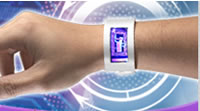 The “wireless tag” business isn’t just for tracking prisoners out on probation: it’s also for tagging holidaymakers and train travellers.
The “wireless tag” business isn’t just for tracking prisoners out on probation: it’s also for tagging holidaymakers and train travellers. Now that the theoretical insecurity is exposed, says AIM Global (the industry body that promotes RFID), systems will be secure. That sounds right.
Now that the theoretical insecurity is exposed, says AIM Global (the industry body that promotes RFID), systems will be secure. That sounds right. The risk to civil liberties may be imaginary, as you can quickly see from the trouble prison officials are having with tagging of criminals. Putting a tag on someone’s wrist or ankle is easy enough, but reading it requires two essential steps. First, the tag has to be there (people have been merrily removing their tags so as to go out to the pub after curfew!) and next, it has to be unshielded. A simple aluminium foil shield around the tag, and it becomes invisible.
The risk to civil liberties may be imaginary, as you can quickly see from the trouble prison officials are having with tagging of criminals. Putting a tag on someone’s wrist or ankle is easy enough, but reading it requires two essential steps. First, the tag has to be there (people have been merrily removing their tags so as to go out to the pub after curfew!) and next, it has to be unshielded. A simple aluminium foil shield around the tag, and it becomes invisible. What would work, would be a system which constantly monitored where the tag was, and was embedded into the skin (as with Professor Kevin “Cyborg” Warwick of Reading University, who wore a dog tag for a week) or into a
What would work, would be a system which constantly monitored where the tag was, and was embedded into the skin (as with Professor Kevin “Cyborg” Warwick of Reading University, who wore a dog tag for a week) or into a  The Oyster system for London Underground is to be extended so that it works on UK railways generally. That will show where the real problems are – and as any Oyster user will tell you, they are already baffling Transport For London. Travellers find that their cards beep at them as they go through the gates, saying “Seek Assistance!” – but when they present them at the ticket office, the staff say “Nothing wrong, go away.”
The Oyster system for London Underground is to be extended so that it works on UK railways generally. That will show where the real problems are – and as any Oyster user will tell you, they are already baffling Transport For London. Travellers find that their cards beep at them as they go through the gates, saying “Seek Assistance!” – but when they present them at the ticket office, the staff say “Nothing wrong, go away.” The New Scientist is reporting that US researchers have discovered a brain mechanism that may link violent computer games with aggression.
The New Scientist is reporting that US researchers have discovered a brain mechanism that may link violent computer games with aggression. Bartholow argues that this reduction in response is correlated with aggressive behaviour.
Bartholow argues that this reduction in response is correlated with aggressive behaviour. The team shipped in a crew of 39 gamers, and quizzed them on the amount of violent games they played, before being shown a series of neutral images interspersed with occasional violent or negative (but non-violent) scenes, while sensors recorded their EEGs.
The team shipped in a crew of 39 gamers, and quizzed them on the amount of violent games they played, before being shown a series of neutral images interspersed with occasional violent or negative (but non-violent) scenes, while sensors recorded their EEGs. Throughout the tests, the violent games experience and P300 response were still strongly correlated with aggressiveness.
Throughout the tests, the violent games experience and P300 response were still strongly correlated with aggressiveness. Freeman also added that stopping people playing violent video games would be like banning them from playing sports such as football or hockey.
Freeman also added that stopping people playing violent video games would be like banning them from playing sports such as football or hockey. Yesterday evening saw a celebration of The Legacy of Arthur C Clarke at the IEE in London.
Yesterday evening saw a celebration of The Legacy of Arthur C Clarke at the IEE in London.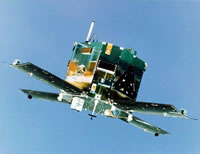 Professor Barry Evans of the University of Surrey considered the 1980’s and 90’s were probably the golden age for communication satellites and predicted their future as an infill technology. Working alongside terrestrial delivery systems, with the possibility of satellite providing TV connectivity to mobile devices outside the fibred home.
Professor Barry Evans of the University of Surrey considered the 1980’s and 90’s were probably the golden age for communication satellites and predicted their future as an infill technology. Working alongside terrestrial delivery systems, with the possibility of satellite providing TV connectivity to mobile devices outside the fibred home. For a long time, Cisco was only focused on high-end corporate sales. This started to change with its acquisition spree. Back In June 2003 it acquired Linksysin order to attack the home and small business markets.
For a long time, Cisco was only focused on high-end corporate sales. This started to change with its acquisition spree. Back In June 2003 it acquired Linksysin order to attack the home and small business markets. DSL is much cheaper to install as it uses existing phone cabling, ratherthan CATV which requires digging up the road, installing fibre tothe street and co-axial cable to the home (this may not be true forgreenfield sites, but in countries with existing infrastructure likethe UK it is).
DSL is much cheaper to install as it uses existing phone cabling, ratherthan CATV which requires digging up the road, installing fibre tothe street and co-axial cable to the home (this may not be true forgreenfield sites, but in countries with existing infrastructure likethe UK it is). Though Cisco have bought Scientific Atlanta, who manufacture the consumerpiece of the puzzle, by expanding the consumer take-up of IPTV they arealso expanding the core network business. Don’t forget, running IPTV servicesrequires a lot of investment in network infrastructure i.e. moreCisco kit.
Though Cisco have bought Scientific Atlanta, who manufacture the consumerpiece of the puzzle, by expanding the consumer take-up of IPTV they arealso expanding the core network business. Don’t forget, running IPTV servicesrequires a lot of investment in network infrastructure i.e. moreCisco kit.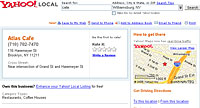 Using search engines has become the second most popular activity for Web users, according to new research from the Pew Internet & American Life Project.
Using search engines has become the second most popular activity for Web users, according to new research from the Pew Internet & American Life Project.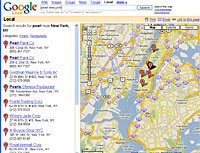 ‘Gen X’ surfers (29-40 year olds, not the Billy Idol-fronted band) were online the most (51 per cent), followed by ‘Gen Y’ users (18-28 year olds), ‘Older Baby Boomers’ (51-59 yrs old), ‘Younger Baby Boomers’ (41-50), ‘Matures’ (60-69) and, finally ‘After work’ (70+). We wonder who makes up these daft categories?
‘Gen X’ surfers (29-40 year olds, not the Billy Idol-fronted band) were online the most (51 per cent), followed by ‘Gen Y’ users (18-28 year olds), ‘Older Baby Boomers’ (51-59 yrs old), ‘Younger Baby Boomers’ (41-50), ‘Matures’ (60-69) and, finally ‘After work’ (70+). We wonder who makes up these daft categories? Sky have been mulling about an IPTV service for a while. They were in discussions with THUS who provide the telecoms back-end for their SkyTalk service and helped Sky with their WapTV services, they were talking about doing an IPTV trial with THUS, but THUS pulled out of the LLU arena due to lack of cash. They were looking at spending £20m+ on just a trial.
Sky have been mulling about an IPTV service for a while. They were in discussions with THUS who provide the telecoms back-end for their SkyTalk service and helped Sky with their WapTV services, they were talking about doing an IPTV trial with THUS, but THUS pulled out of the LLU arena due to lack of cash. They were looking at spending £20m+ on just a trial.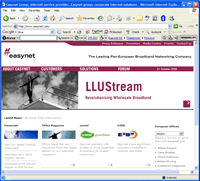 Sky have got the resources to bolster a depressed telecoms market and put the necessary cash into a company to achieve a reasonable roll-out. Of course they also have the content that consumers want. If another “triple-play” broadband provider wants to get into the game (including BT Retail), Sky can make it very difficult for them by not licensing Sky content (of course Ofcom may force them to, as they have done in the cable industry).
Sky have got the resources to bolster a depressed telecoms market and put the necessary cash into a company to achieve a reasonable roll-out. Of course they also have the content that consumers want. If another “triple-play” broadband provider wants to get into the game (including BT Retail), Sky can make it very difficult for them by not licensing Sky content (of course Ofcom may force them to, as they have done in the cable industry).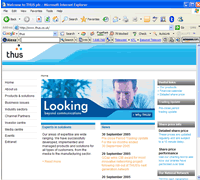 Sky are also in an odd position as they’ll probably utilise MPEG-4 as the coding system, which means they’ll have to modify (or supplement) their existing transmission systems which are all based on MPEG-2. They’ll also have to introduce a new IP based set-top-box. However they’ll have to be carefull as to not make it too feature rich compared to existing STB’s used to decode the satellite transmissions or existing users will want to migrate to the broadband version – which will cost Sky a huge ammount as the exisitng boxes are considerably subsidised.
Sky are also in an odd position as they’ll probably utilise MPEG-4 as the coding system, which means they’ll have to modify (or supplement) their existing transmission systems which are all based on MPEG-2. They’ll also have to introduce a new IP based set-top-box. However they’ll have to be carefull as to not make it too feature rich compared to existing STB’s used to decode the satellite transmissions or existing users will want to migrate to the broadband version – which will cost Sky a huge ammount as the exisitng boxes are considerably subsidised. Meg Whitman, CEO of eBay
Meg Whitman, CEO of eBay 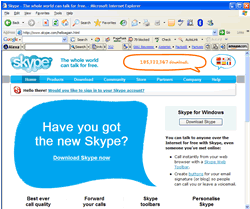 ___What does eBay add?
___What does eBay add? The UK market for online shopping looks set to soar to £60 billion (~€88 billion, US$108 billion~) by 2010 according to a new report.
The UK market for online shopping looks set to soar to £60 billion (~€88 billion, US$108 billion~) by 2010 according to a new report.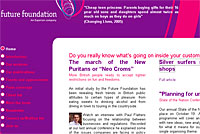 The Future Foundation commented that websites sporting yoof-orientated design, teensy weensy text and kray-zee interfaces are likely to miss out on silver surfer sales.
The Future Foundation commented that websites sporting yoof-orientated design, teensy weensy text and kray-zee interfaces are likely to miss out on silver surfer sales. New research from UK High Street bank Halifax reveals that over half of children between the ages of seven to sixteen years old have bought something over the Internet.
New research from UK High Street bank Halifax reveals that over half of children between the ages of seven to sixteen years old have bought something over the Internet. Not surprisingly, age plays a big part in who gets to shop online with less than a third of seven to eleven year olds (29%) clicking and buying compared to almost three quarters of twelve to sixteen year olds (73%).
Not surprisingly, age plays a big part in who gets to shop online with less than a third of seven to eleven year olds (29%) clicking and buying compared to almost three quarters of twelve to sixteen year olds (73%).